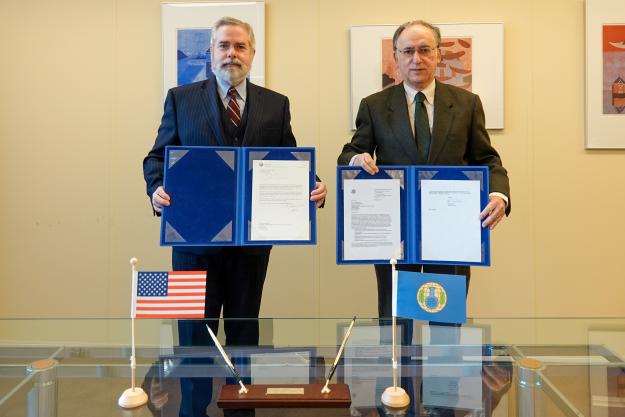The Government of the United States of America has contributed €165,000 to support the work of the Regional Conference on Enforcing Effective Customs Control over the Trade in Toxic Chemicals in Africa. This is the United States' second contribution to the Africa Programme.
The pan-African conference will bring together African customs administrations, Chemical Weapons Convention (CWC) National Authorities, and customs administrations from other regions to share best practices in the enforcement of control over the trade in toxic chemicals.
The contribution was formalised during a ceremony held today between the Permanent Representative of the United States of America to the OPCW, H.E. Ambassador Joseph Manso, and OPCW Director-General, H.E. Mr Fernando Arias.
Ambassador Manso stated: "The United States strongly supports the OPCW's Africa Program. The Program's assistance to Member States in the areas of laboratory capacity building, chemical safety and security, and national implementation of the Convention is important not only for our friends and partners in the Africa Group, but for all of us interested in the enduring success of the Convention."
The Director-General expressed: "I appreciate today's generous contribution by the Government of the United States, further signalling the USA's steadfast commitment to the effective implementation of the Chemical Weapons Convention and support for OPCW Member States in Africa. Combatting illicit trade in hazardous chemicals is a cross-cutting effort in which custom authorities play a critical role."
Director-General Arias encouraged Member States to support other special projects announced last year by the Technical Secretariat within the framework of the OPCW Programme for Africa.
This is the second contribution the United States has made to the Africa Programme. In November 2020, the United States contributed US$110,000 to fund a specialised analytical chemistry course for customs laboratories in Africa, as well as a training on hospital preparation for chemical incidents in East Africa.

Background
The contribution was made to the OPCW Trust Fund for Implementation of Article X of the Chemical Weapons Convention (assistance and protection against chemical weapons).
The Regional Conference on Enforcing Effective Customs Control over the Trade in Toxic Chemicals in Africa is part of OPCW's Programme to Strengthen Cooperation with Africa on the Chemical Weapons Convention, more commonly known as the Africa Programme. It focuses on the particular needs of African Member States, including the promotion of peaceful and authorised uses of chemistry for a developed, safe, and secure Africa.
The Africa Programme continues to be funded mainly through the OPCW regular budget. Extrabudgetary resources are also used to further expand the Programme's depth, reach, and impact. In this context, specific activities have been attracting in‑kind and financial support from the Czech Republic, France, Germany, Switzerland, the United Kingdom of Great Britain and Northern Ireland, the United States of America, and the European Union. Moreover, in‑kind support has been provided by African Member States co‑organising activities under the Programme.
As the implementing body for the Chemical Weapons Convention, the OPCW, with its 193 Member States, oversees the global endeavour to permanently eliminate chemical weapons. Since the Convention's entry into force in 1997, it is the most successful disarmament treaty eliminating an entire class of weapons of mass destruction.
Over 98% of all declared chemical weapon stockpiles have been destroyed under OPCW verification. For its extensive efforts in eliminating chemical weapons, the OPCW received the 2013 Nobel Peace Prize.






